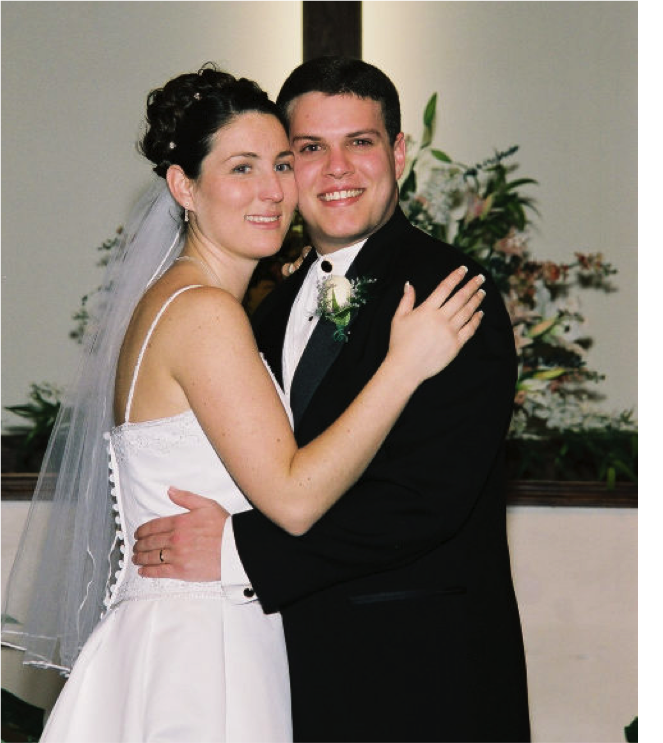I had a pretty idyllic childhood. I was born into a multi-generational family of faith. Mine was the kind of family who was at the church building every time the doors were opened. As a young child, I learned all the characters of the Bible, from Daniel in the lion’s den to the wee little man, Zacchaeus. As I grew older, I was taught the meanings of these stories and how to apply them to my life. My parents were outstanding examples of how to live out your faith and love your neighbor. They were supportive, and encouraging to my brother and me. I have a very specific memory of my mother, probably during my middle school years, saying to me “Mandy, you can be anything you want to be in life. Except for maybe something like a Prima Ballerina.” I love my mom for her optimism shaded with a dose of reality, and I completely believed her.
My mom’s words forever in the back of my head, I confidently sailed through high school and college, and into my first job as an engineer. I was successful, proud, and determined. And then I got married.
During my first few years of married life I got my first bitter taste of failure. Ultimately, the marriage did not fail, and Derek and I recently celebrated our 13th anniversary, but I was a fantastic failure as a wife. I never truly knew what people meant when they described something as “by the grace of God” until the smoke cleared and I was able to look back at the ashes of our youthful hopes and dreams. Our faith enabled us to hang on when hope was all but lost, and God provided the strength to rebuild, but there were moments of despair until we learned to let Him provide.
I can’t tell you exactly where things went wrong, although immaturity, poor choices, and selfishness surely share some blame. I do, however, know that the situation continued to decline because of my unwillingness to admit that I couldn’t fix things myself. Before I got married, I had received sage advice on the prospects of trying to change your spouse. I was thoroughly unprepared for how desperately I would want to change myself. I could see my behavior; I could see the consequences before they happened, and yet I couldn’t stop myself. As the Apostle Paul so aptly put it in Romans 7:15, “I do not understand what I do. For what I want to do, I do not do, but what I hate I do. I belittled my husband, challenged his every decision, and complained about his every action, riddled with guilt and remorse all the while.
Things finally got back on track when we became more involved with and committed to our local church. I joined a women’s Bible Study, and the act of opening my Bible twice a week (once during our meeting time, and once to cram all six daily devotions into an hour) was enough to soften my heart and change my ways. The Holy Scripture I consumed softened my heart and changed my attitude. I spoke about this transformation at a women’s event just a few weeks after our fifth anniversary, commenting on how it was the first April 5th that we had truly celebrated. Previous anniversaries had been “observed,” much like the observation of Pearl Harbor Day.
Less than a year after that ladies’ luncheon, I became pregnant with our first child. While we were elated at the idea of taking this next step in our lives, we approached with caution because of a previous miscarriage. We waited until I had entered my second trimester to share the excitement of our expected family addition, because according to all of the authoritative books and websites, that thirteenth week is a critical threshold. Once you pass it you are considered to be “safe” from most risk. I have vivid memories of the Easter Sunday when we finally shared our long-kept secret. As we repeated the news to each branch of our large but close-knit family, I realized how much joy this baby would bring to so many people. Two short weeks later that blissful emotion would be torn away from all of us by a devastating diagnosis.
It was a routine ultrasound, offered up as an early screening for genetic disorders. Without really considering the possibility that a problem might be unveiled, I eagerly consented to the extra opportunity to take a peek at my quickly growing baby. I hoped that listening to the heartbeat and watching the tiny life form perform in
utero gymnastics would quell my nagging anxiety and fears of a repeat miscarriage. Little did I know that a naturally occurring miscarriage would soon be something I was praying for.
The room was dim and quiet, the electric hum of medical equipment nearly lulling me to sleep. I reclined in an oversized leather chair, expanding midriff exposed and covered with goo. The nurse waved her magic sonogram wand, and there he was, the miracle of life presented as a grainy, wiggly image on a flat screen TV. I smiled in relief as I watched him bounce around. He was growing and active, and the fear of miscarriage could be put aside to wrestle with on another day. My heart was filled with joy as I gazed upon this brand new soul that could be claimed as my own child.
The nurse shifted the probe along the curve of my belly and punched in keys as she took measurements. Her trained eye deftly identified body parts that I would never have discerned on my own. Once she pointed them out, and explained the angle, however, I began to make out the child’s form and recognize the features of a tiny human being. After a while she let us know that she was having some trouble getting one of the measurements, but not to worry, she would have the doctor finish the job. Without the smallest bit of alarm, my husband and I sat patiently, as the nurse left the room and we waited for the doctor. A few minutes later the nurse returned and introduced Dr. Kenna, who sat down beside me and took his turn at the controls. Using keyboard and transducer, he manipulated the ultrasound device and navigated through my womb. The echoes of the sonic waves directed through my body were translated into geometry and motion, and then displayed as a gray-scale image that the doctor examined intently. He and the nurse consulted back and forth, using medical lingo that was yet foreign to my ears, but represented a world of disorders, diagnoses and prognostics within which I would soon become entrenched. I watched the process, mesmerized by the power of advanced technology.
Wrapped up in watching this medical team at work, I was surprised when Dr. Kenna turned to address Derek and me with a gentle, but firm voice. “Unfortunately you aren’t going to be able to get the screening you came here for today because we are seeing a problem with this baby.”
An instantaneous, system-wide panic overcame me like a convulsion and erupted as a violent marriage of gasp and sob. The nurse handed me a box of tissues as my husband and I ingested the most devastating piece of information we had ever been handed. I sat there, unused tissue wadded up in my hand, as Dr. Kenna elaborated on the situation. At some point very early in the pregnancy, likely before I even knew about this marvelous creation forming inside of me, the baby’s neural tube failed to close completely, resulting in a gap in his skull. As his nervous system developed, brain matter began to push through this gap and a “sac-like protrusion” formed outside his skull. The fact that this deformity was detected so early in the pregnancy was not an encouraging sign. It indicated a large hole that would likely permit significant brain structure to grow where it did not belong.
“I don’t know what you’re religious views are, but . . .” he trailed off in a somber tone, leaving unspoken the horrific conclusion to his sentence. He suggested a consultation with the in-house genetic counselor as our next step before graciously exiting the room and leaving the two of us distraught parents-to-be to process this turn of events.
My chest was tight, my dry eyes burned, and a wild panic began to bubble up inside of me. The door closed and I threw myself at my Derek. He wrapped his arms around me as I clung to him. I took a deep breath and reminded myself that I serve a living God who reigns in Heaven and on earth. My God is good, and he fills our lives with blessings. Although we may go through trials, my God walks with me through them and he delivers me. He uses all things for the good of his people. At my most terrifying moment, when faced with one of my worst fears, I remembered all of these things I had spent my whole life learning, and I was overcome by a sense of peace. It was not a perfect peace, but it was enough to compose myself and walk out of that room. As I took those steps, I began a journey, not knowing where it would bring me, not knowing what hardships I would face, but knowing I would never walk alone.

